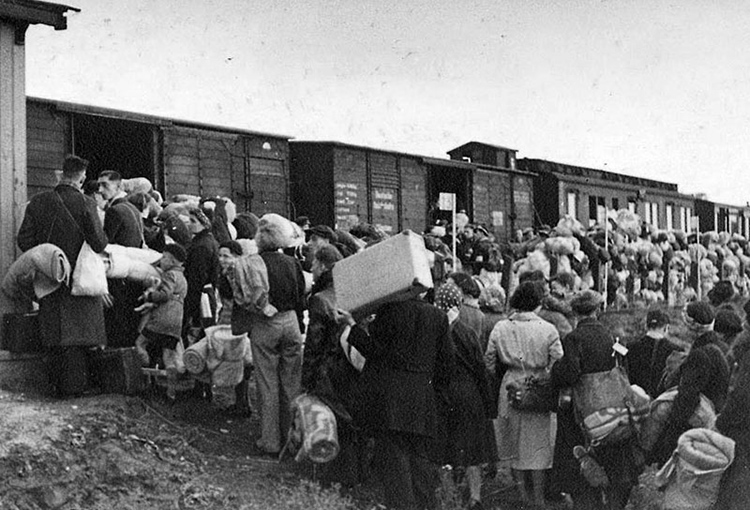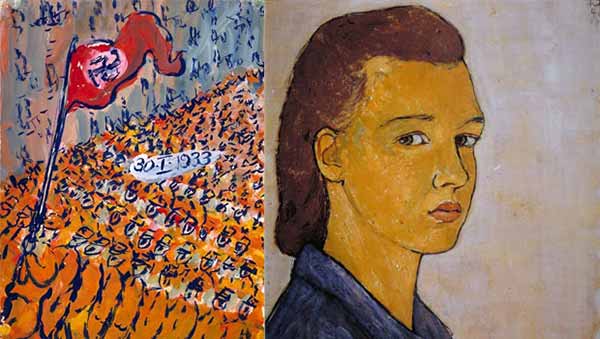
2015-16 Holocaust Living History Workshop Series Highlights “Holocaust Journeys”
Published Date
By:
- Nikki Kolupailo
Share This:
Article Content

“Jews boarding a deportation train at Westerbork transit camp in the Netherlands.”
The 2015-16 Holocaust Living History Workshop (HLHW) series continues this January with six compelling authors, films, and other events highlighting the diverse “Holocaust Journeys” of survivors and others recounting their personal stories. Co-sponsored by the University of California, San Diego Library and the UC San Diego Jewish Studies Program, the HLHW lecture series invites local Holocaust survivors, witnesses, relatives, and scholars to share their personal stories and memories with students and interested members of the public. The goal of the program is to broaden understanding of the past, foster tolerance, and preserve the memory of victims and survivors of the Holocaust.
All events are free and open to the public, and are held on Wednesdays on the UC San Diego campus in Geisel Library’s Seuss Room from 5 to 7 p.m., with some exceptions (as noted below).
January 13–2Think Only of Today: A Documentary Film about the Life of Holocaust Survivor, Max Garcia (With Alberto Lau and Robert Schneider)
Think Only of Today traces the life of Max Garcia from his childhood in Amsterdam, through the Holocaust, and finally to his immigration and life in the United States. Born in 1924, Max was interned in Westerbork before being deported to Auschwitz and later Mauthausen. The documentary, which follows Max’s ordeal through war and incarceration, also explores the effect of the Holocaust on succeeding generations. Interviews with Max’s children and grandchildren reveal the different ways individuals from each generation have grappled with the burden of such a searing experience.
February 10–Exile in Ecuador (With Moselio Schaechter)
Moselio Schaechter spent his childhood in Mussolini’s Italy. Thanks to a transit visa for Portugal and the United States, the Schaechters made it to Quito, Ecuador in January 1941. Over the next nine years, Moselio struggled to accommodate his Jewish identity with a nascent South American self. In this talk he shares memories of his youth, his experience in the Ecuadorian Jewish refugee community, his life in the U.S., and his subsequent visit to his old "home." Schaechter is a distinguished professor emeritus at Tufts University and an adjunct professor in microbiology at SDSU and UC San Diego.

“Works by German-Jewish artist Charlotte Salomon who died at Auschwitz in 1943.”
March 2—Charlotte Salomon’s Interventions (With Darcy C. Buerkle)
Sponsored by Daniel and Phyllis Epstein
Historian Darcy C. Buerkle discusses her recent book, Nothing Happened: Charlotte Salomon and an Archive of Suicide, which examines the life of writer and artist Charlotte Salomon. Born into a highly cultivated Jewish family in Berlin, Salomon was deported to Auschwitz and murdered at the age of 26. In her final work Life? or Theatre?, which consists of 769 autobiographical gouache paintings, she envisioned the circumstances surrounding the eight suicides in her family, all but one of them women. Buerkle is an associate professor of history at Smith College.
April 13–Serenade: A Memoir of Music and Love from Vienna and Prague to Los Angeles (With Carol Jean Delmar)
Serenade is Carol Jean Delmar's tribute to her parents' life, love, and suffering. Her father, Franz Jung, was a budding opera singer in prewar Vienna when his dreams were halted by Hitler's annexation of Austria. Franz and his wife Franziska fled Vienna with help from the HIAS (Hebrew Immigration Aid Society). Sadly, after reaching safety he lost his voice, which forced him to abandon his career. In this presentation, Delmar, a Los Angeles-based opera and theatre critic, recreates her parents' story from Vienna to Hollywood and traces her own journey in the footsteps of their experience.
May 4–Chava Rosenfarb's The Tree of Life: An Epic about Life in the Lodz Ghetto (With Goldie Morgentaler)
Sponsored by Laurayne Ratner
Goldie Morgentaler, a professor of English literature at the University of Lethbridge, discusses the work and life of her mother, Chava Rosenfarb, one of the greatest Yiddish writers of the mid-20th century. Born in Lodz, Poland in 1923, Chava began writing poetry in the ghetto. After barely surviving internments in Auschwitz and Bergen-Belsen, she was homeless and stateless for several years before immigrating to Canada, where she married the abortion rights activist and physician Heniek (Henry) Morgentaler.
June 1–Tom Segev: Living with the Holocaust
Sponsored by William and Michelle Lerach / Jeffrey and Marcy Krinsk
Historian, author, and journalist Tom Segev brings an unflinching look at Israel's history and tortured attempts to come to terms with the Holocaust. Born in in Jerusalem to parents who had fled Nazi Germany, Segev is a leading figure among the so-called New Historians, who has challenged many of the country's traditional narratives or "founding myths." His books include The Seventh Million: the Israelis and the Holocaust (2000); One Palestine Complete: Jews and Arabs under the British Mandate (2000); 1967: Israel, the War, and the Year That Transformed the Middle East (2006); and Simon Wiesenthal: The Life and Legends(2010). This event will be held in the Calit2 Auditorium at 5:00 p.m.
For more information about UC San Diego's Holocaust Living History Workshop, contact Susanne Hillman at HLHW@ucsd.edu or 858-534-7661. More information can also be found here.
Share This:
You May Also Like
Stay in the Know
Keep up with all the latest from UC San Diego. Subscribe to the newsletter today.


